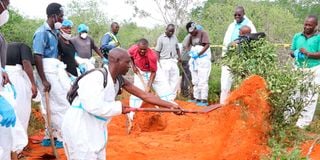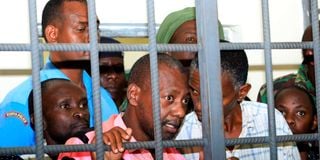Premium
Murkomen makes rare admission of State, intelligence failures over Shakahola deaths
The government has for the first time admitted to failing in its duty to protect more than 450 Kenyans who died in the Shakahola forest after being lured into a deadly fast.
Interior Cabinet Secretary Kipchumba Murkomen acknowledged the State’s failure but stopped short of naming those whose negligence may have contributed to the mass killings that shocked the nation in 2023.
“The act of omission and commission on the part of the security and administration team is a matter still under investigation. We cannot yet say whether specific individuals are culpable. I do not want to cast blame on those who served at the time until we have proper evidence,” he said during a media briefing in Kilifi on Wednesday April 9.
According to the Interior CS, security lapses that led to the tragedy may have occurred as early as 2020 or 2021.
However, he noted that the Kenya Kwanza administration only came into office towards the end of 2022.
The Shakahola massacre was uncovered in April 2023.
Witnesses’ accounts have shown that followers of Good News International Church, associated with controversial preacher Paul Mackenzie, started streaming into the expansive forest as early as 2020.

Locals from Shakahola Centre help dig up graves at Shakahola Forest part of the 800 acres linked with cult leader Paul Mackenzie of Good News International Church on June 6, 2023 during the third phase of the exhumation that was witnessed by Interior CS Kithure Kindiki.
“But the Shakahola killings should never have happened. It was a failure by the government to protect its citizens. Nearly 500 people died due to religious extremism and radicalisation,” he stated.
Mr Murkomen appeared to absolve the Shakahola community of responsibility, explaining that locals found it difficult to question controversial preacher Paul Mackenzie due to the deep respect afforded to religion.
He added that many families allowed their relatives to attend prayers and never followed up on their whereabouts—reflecting a broader societal issue where people lose contact with loved ones without raising alarm.
“This is something that should not happen in a country with such a large security apparatus. Whether someone received intelligence from the ground and failed to act is something we must still investigate,” he said.
The Interior CS also noted that many locations across the country are used for prayer and fasting.
“When people say they’ve gone to pray—especially in a religious country like ours—others tend to leave them alone, believing they should not interfere with those fasting and praying,” he said.
At the same time, Mr Murkomen reversed his earlier position dismissing concerns about funding, now admitting that the government needs a dedicated budget to complete DNA sampling and identify the over 450 victims of the massacre.
Just days after denying financial constraints, Mr Murkomen acknowledged that a budget is essential to expedite the Shakahola investigations and bring closure to grieving families.
“Of course, there is competition for resources, but this issue is not just about money. It’s about cooperation, obtaining the right samples, and enhancing our capabilities,” he said.
He emphasised the need for investment in modern DNA testing procedures.
“Technology is evolving and times are changing, and we must invest more in this area,” he said.
Mr Murkomen said there is an urgent need for a one-off budget that covers both the collection of samples and data, and more importantly, the final stages of the investigation.
“We are putting in a lot of effort, but perhaps in the next financial year, we should allocate a specific budget to bring the Shakahola case to a close,” he said.
He also raised the issue of unidentified victims, noting the challenges in cases where no relatives have come forward for DNA matching.

Shakahola cult leader Paul Mackenzie (in pink) is pictured with some of his followers at the Shanzu Law Courts in Mombasa County on May 2, 2023.
Additionally, he proposed a long-term solution regarding the Shakahola site.
“Can we turn it into a memorial to honour victims of religious extremism and radicalisation? It should serve as a reminder of our collective failure as a society to protect vulnerable citizens,” he said.
Mr Murkomen also called on the judiciary to prioritise the Shakahola case and allocate at least three to six months for expedited hearings.
“We would be grateful if the courts could dedicate three to six months to conclude the case and ensure that victims and their families receive justice,” he said.
He added that consultations with the judiciary were ongoing to ensure the Shakahola site is preserved and secured.
Over 30 witnesses have testified in cases facing Mackenzie and his 94 accomplices in the Mombasa, Tononoka, and Shanzu courts.





